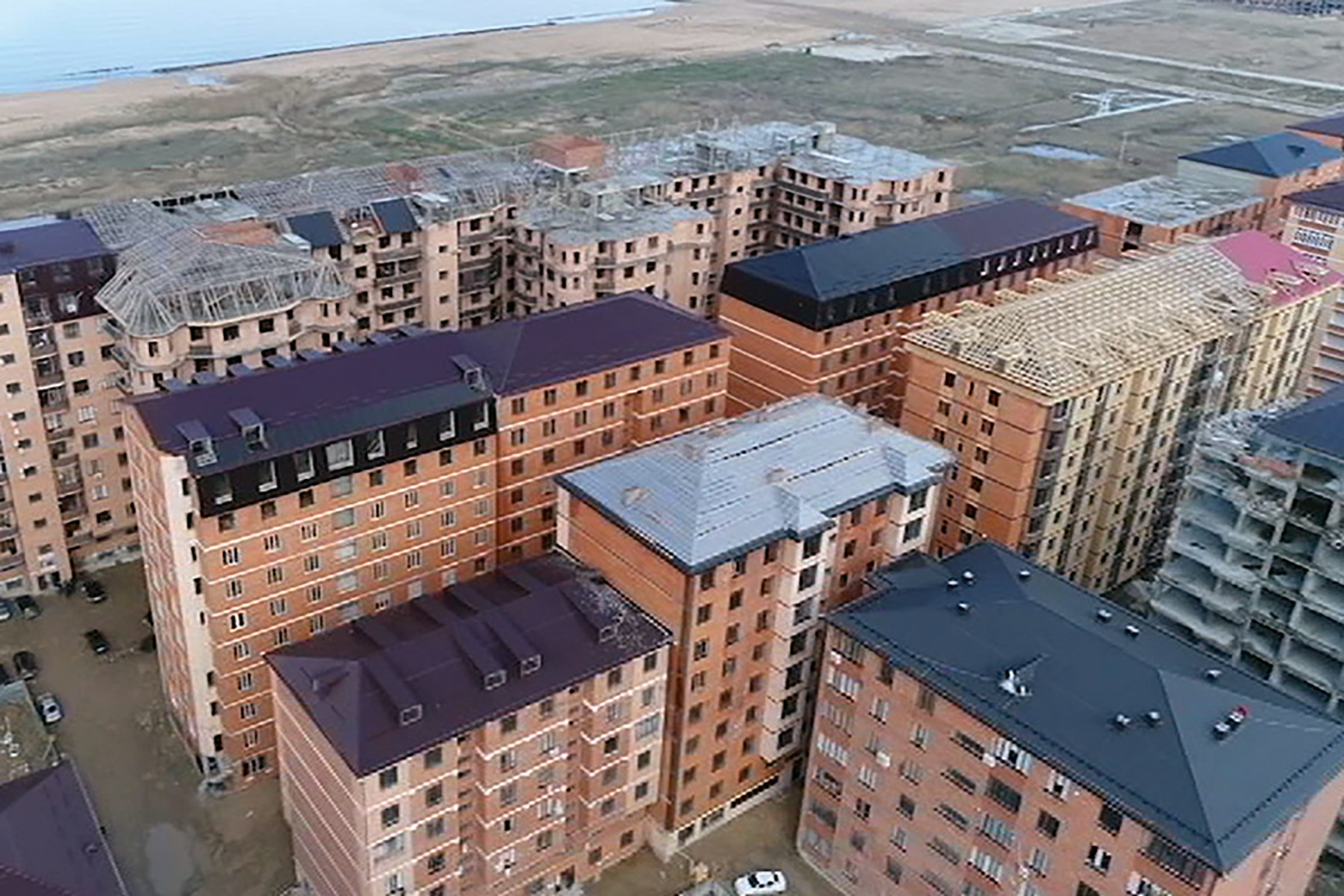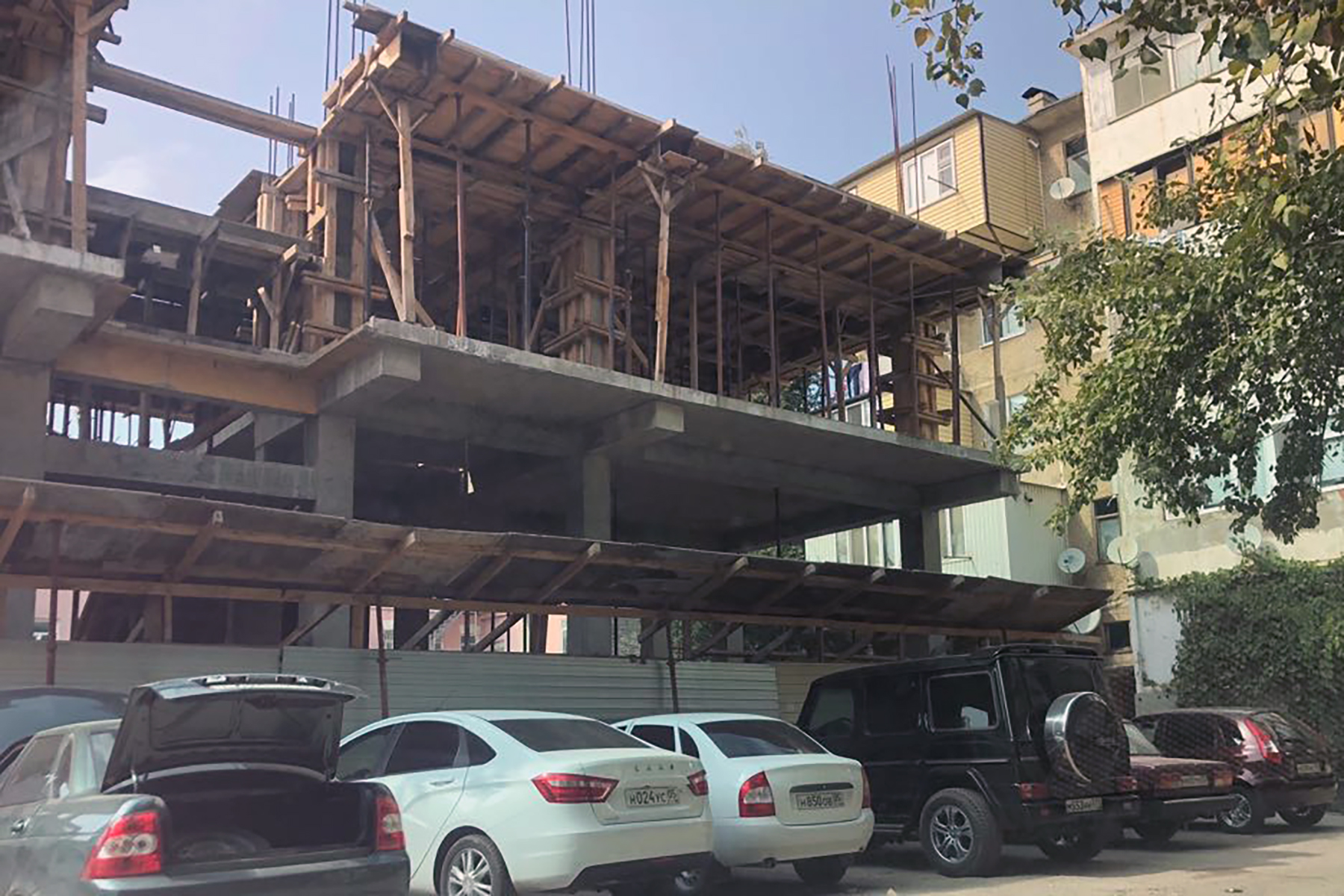
Illegal high-rises have mushroomed in Makhachkala, the capital of Daghestan— the fruit of a corrupt process two decades in the making.
Lawyer and Makhachkala resident Abdurashid Abdurashidov had a yard he could see from the window of his flat. It had a small park, garages, and a place for children to play sports. In 2012, he found out it would be torn down. The local prosecutor’s office said it needed a new administrative building. The strange thing was, they already had one, just down the street.
When the construction had finished Abdurashidov discovered that instead of seeing a new prosecutorial office outside his window, he saw a block of flats. It had been a building-sized bait-and-switch.
Despite assertions by the republic’s government that they would tackle illegal land seizures and bring the perpetrators to justice, for many of the victims, very little has changed.
For years, Abdurashidov has been fighting in court to have the 2012 seizure of land near his flat declared illegal and the courts have held repeated meetings on the case, but nothing has come of it.
He believes that the illegality of the situation is obvious. Not only because the yard was not zoned for residential construction but also because of the sheer deception involved.
‘The representative of the prosecutor’s office in court had the audacity to declare that they needed the land’, he said. ‘Only to construct a residential building.’
Abdurashidov said that the Daghestani Prosecutor’s Office had recently positioned itself as an ‘ardent fighter’ against illegal construction and illegal land seizures, but it ‘does not respond to the illegal actions of the Makhachkala administration when it concerns the interests of the [administration] itself’.
OC Media reached out to the Prosecutor’s Office but they declined to comment until Abdurashidov’s court case had come to a conclusion.
A history of corruption
Said Amirov was the mayor of Makhachkala from 1998 until 2013 — when he was arrested on charges of terrorism and commissioning contract killings. It was under his troubled tenure that the illegal seizure of land became commonplace.
New high-rises multiplied throughout the capital, often enough, in the courtyards of existing blocks of flats — as happened with Abdurashidov. The problem reached its zenith in 2015 when protests against the practice shook the city.
When the republic’s most recent administration came to power in 2018, they promised to deal with Amirov’s legacy.
According to the Makhachkala City Hall, 328 illegally erected apartment buildings were identified and scheduled to be demolished in 2018. The same year, the administration returned 250 land plots, which were acquired by falsified documents, to municipal ownership.

However, these pale in view of the scope of the problem. A year prior, in January 2017, then-Deputy Mayor of Makhachkala Kurban Kurbanov stated in a meeting that the mayor’s office had identified roughly 4,000 falsified deeds of real estate ownership, and transactions.
The scheme
Victim testimony and hearings held in the Makhachkala Public Chamber have detailed the modus operandi of illegal land seizures in Makhachkala.
The prospective owner of a particular plot of land approaches the Makhachkala City Administration, they then pay a bribe to the officials present.
Arsen Magomedov, a lawyer specialising in land disputes, told OC Media that the bribes are usually paid to officials in the Department of Architecture and Urban Planning, as well as the relevant Deputy Mayor who is in charge of the district.
In return for the bribe, according to him, officials draw up a fake, back-dated resolution that affirms the person as the legal owner of the property and applies a fake signature and an official seal.
This document, he said, is then placed in the city archives.
He said that if it is revealed to the public that a particular resolution has been falsified, the municipality will sometimes protect itself from recrimination by attempting to block the construction in court while knowing full-well that the judicial system will recognise it to be legal.
Abdurashidov told OC Media that he believes that cooperation between the municipal authorities and the judiciary in the service of such illegal land seizures is all done with the knowledge and assent of the Makhachkala Mayor’s Office.
Nonexistent owners
Musa Gadzhimuradov, a construction worker living in Makhachkala, told OC Media of his personal experience with the scheme.
In 2011, Gadzhimuradov was hoping to challenge the sale of an 80,000 square metre lot located next to his office.
In the contract of sale for the land, he discovered that, contrary to protocol, the full name of the seller was not listed, only his surname and initials.
However, after visiting the Mayor’s Office, Gadzhimuradov was able to find out the full name of the seller. This name, he said, did not appear in the address bureau or the registry office.
In the registration chamber, Gadzhimuradov was told that according to a municipal resolution — resolution no.112 — prior to the sale, the site was officially registered to a person with the same initials, but a different patronymic to the one registered in the Mayor’s Office.
After a further investigation in the archives, Gadzhimuradov found the resolution. It dated back to 2005, and was shocked to find that there were two different versions of it.
While one pertained to the land sale the other was completely unrelated and was instead about granting the title ‘Honored Worker of Agriculture of the Republic of Daghestan’ to a Makhachkala resident.
Gadzhimurdov is certain that the land sale resolution is fake.
He says that someone in the Makhachkala municipal administration issues such duplicate resolutions in order to be able to effectively hide them in the archives.
Gadzhimuradov said that these fake resolutions are being put in the archives without additional verification. Thereafter, the fakes are recognised as having legal force in the courts, and are, in effect, laundered.
If the substitution is noticed, he said, then the city hall refers to the fact that the archive has lost data and claims the document cannot be checked.
Gadzhimuradov says that his statements ‘about a fake resolution and the transfer of ownership to a non-existent […] person’ were not followed up on by law enforcement agencies or the Supreme Court of Daghestan.
The Chairman of the Supreme Court of Daghestan, Sergei Suvorov, allegedly told Gadzhimuradov that he was ‘not accepting complaints on land issues’.
Family Connections
The ownership of the land plot next to Gadzhimuradov’s office was registered by the acting head of the department of the Federal Cadastral Chamber of Daghestan, Magomedrasul Amirov.
His father, Magomedsalam Amirov, is a judge on the Kirov District Court of Makhachkala and is the brother of the disgraced former mayor of Makhachkala, Said Amirov.
And this is far from the only such case that Magomedrasul Amirov had been involved in.
In 2014, a plot of land belonging to Gadzhimurad Bulatov, a Makhachkala-based Sambo coach, was taken from him.
‘They took control of his plot in exactly the same way — using fake resolutions and the right of ownership was registered […] by the son of the judge Magomedrasul Amirov’. Bulatov’s lawyer, Aydimir Basirov, told OC Media.
According to Basirov, they secured a criminal case for the unlawful seizure of Bulatov’s land last October, but there are still no suspects in the case. ‘The investigators say that they cannot interrogate Magomedrasul Amirov, as he is the son of a judge’, he said.




 25 September 2019
25 September 2019


